As bookstore chains go under, let’s dust indie alternatives off the shelves.
Bookstores have always been my favourite places on earth. Every shop has something different to offer, whether that be ancient annotated paperbacks, rows of pristine colour-coordinated hardcovers, stray cats in the window, or a piano in the back. Where small businesses may lack stock or organization, they make up for it with charm and personality. But when local bookshops and big chains are forced to battle it out, who will ultimately win?
The answer may surprise you. Since the early 2000s, it has seemed like independent bookstores are racing toward extinction with the rising popularity of online shopping and the prevalence of chains such as Indigo. In recent years, however, there is a growth trend in favour of independent bookstores. Interestingly, it’s the big names that are struggling: Indigo lost $50 million last year following cyber-attack issues, and the company appears to be falling apart as their management struggles to regain control.
In comparison, independent booksellers across Canada have reported booming sales as readers flock to their doors in search of something more. These bookstores give readers that extra something: a sense of community. Walking into a small shop is more personal and deliberate, as it forces you to confront the humanness of everyone sharing the space, and you feel obliged to take real care when handling the books. Supporting these businesses is essential to ensure they stay with us for many years.
The Word, located within walking distance of McGill, is one example of a local bookstore to enjoy. The space is vividly personal with its pleasantly cramped interior and impressive turnover of over a hundred new titles each day. “I think what’s good about these kinds of stores, but even more with bookstores is that when you walk in, there’s a sense of passion,” said Scott Moodie, who has been working at The Word for the past 32 years.
Luckily, you can find this passion everywhere in Montréal bookstores. Here are a few of my favourites, and what makes them so special:
Drawn & Quarterly: A familiar favourite, this bookshop specializes in graphic novels and hosts frequent readings. I love it for its bright decor and open feel.
Encore Books & Records: My go-to! It’s a bit out of the way, but so worth it. The bright blue exterior will immediately pull you in, and you won’t escape–it’s hard to pull away from the rooms of books and fun record collection.
Phoenix Books: If you’re at Encore, might as well check out Phoenix just down the road! The space is small but uncluttered, and they often host performances. The owner is super kind and always willing to help you find a book.
Librairie Henri Julien: A funky little gem, this one satisfies your need for organized chaos with teetering stacks of books and colourful murals.
Though chain bookstores have their advantages, in my mind the small dusty bookstores will always win. All Indigos are the same, but each small bookstore is different—you never know what treasures you’ll find.
